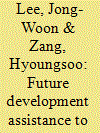|
|
|
Sort Order |
|
|
|
Items / Page
|
|
|
|
|
|
|
| Srl | Item |
| 1 |
ID:
151437


|
|
|
|
|
| Summary/Abstract |
Since the coming to power of Kim Jong Un in 2012, the North Korean government has recently announced, and to some degree has implemented, a new set of economic management policies known as the June 28th measures in 2012 and the May 30th measures in 2014. Both of these sets of measures seek to build upon the abandoned reforms of the early 2000s through restructuring North Korea's highly inefficient collective farm and state-owned enterprise management system. In addition, the government has intensified ongoing efforts at building special economic zones for the purpose of attracting foreign investment. As such, the country is attempting to emulate the reforms adopted by China in the late 1970s. Although the success of these efforts is by no means guaranteed, they do serve to question mainstream analyses that suggest that Juche Self-Reliance or Sŏn'gun Military First Politics ideologies will inhibit any genuine attempt at economic reform in North Korea. We argue, in contrast, that ongoing changes to North Korean state and society mean that, a cyclical stop and start rhythm to the reforms notwithstanding, such attempts at economic reform are likely to continue. However, we also argue that while the contemporary reform drive resembles and may indeed reproduce some of the successes of the Chinese experience, North Korea faces significantly greater challenges, including the greater decline of North Korean industry, local resistance to reform, and the dangers of inflation. Furthermore, North Korea faces a highly challenging external security environment that undermines the ability of the regime to attract investment and by extension the political standing of reformist elements within the country. Given this contrast with the international environment surrounding China's own reform experience, our analysis emphasises the importance of geopolitical context in shaping experiences of economic reform and of development more broadly.
|
|
|
|
|
|
|
|
|
|
|
|
|
|
|
|
| 2 |
ID:
124583


|
|
|
|
|
| Publication |
2013.
|
| Summary/Abstract |
Purpose-This article explores multilateral engagement in the economic rehabilitation of North Korea, with particular focus on the establishment of special trust funds.
Design/methodology/approach-The study consists of an analysis of international assistance to North Korea that addresses policy measures for improving the quality of aid delivery. Conceptual and empirical issues around multi-donor trust funds (MDTFs) are explored by conducting an examination of the role of aid coordination, management practices in multilateral aid, and the potential benefits of trust funds.
Findings-The setting up of trust funds is a possible option for resource mobilization and aid coordination in the provision of development assistance to North Korea. Given the potential benefits of such an aid modality, the creation of one or more MDTFs as a means of facilitating the denuclearization process on the Korean Peninsula could help strengthen relations between Pyongyang and the international donor community. In drawing attention to issues around the administrative structure of the MDTF, this article proposes that international donors establish a North Korea Development Assistance Group (NKDAG) as the principal trust fund governing body.
Originality/value-This is the first policy-oriented study detailing the possible establishment of MDTFs in the North Korean context. The suggestions of the article could contribute to efforts of the international community to improve the transparency and effectiveness of its aid contribution to North Korea.
|
|
|
|
|
|
|
|
|
|
|
|
|
|
|
|
|
|
|
|
|